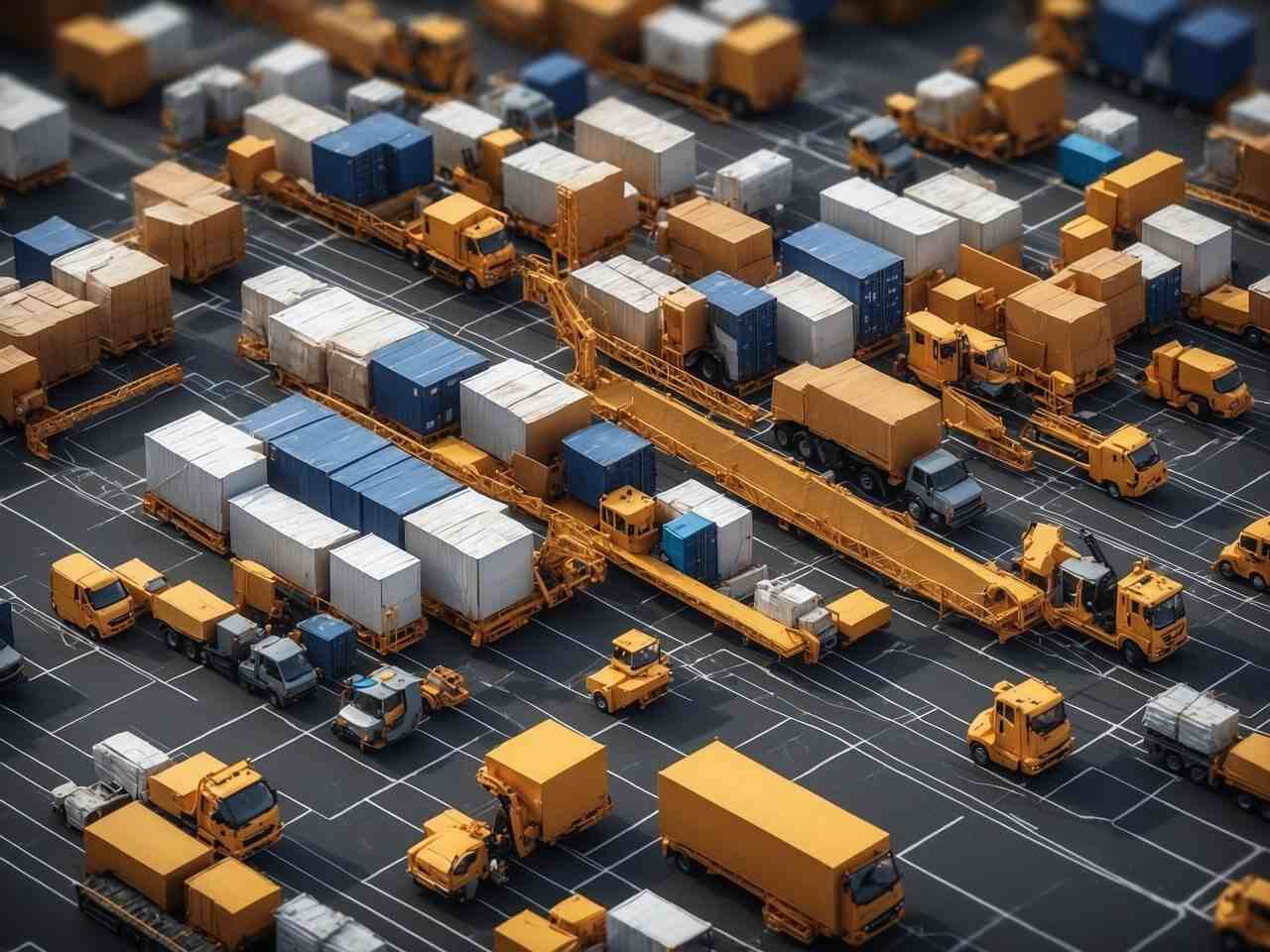Logistics management holds immense importance in the business world. It plays the role of a bridge between businesses and the end users.
Therefore, a slight error in management can disrupt the supply chain. As a result, businesses can suffer losses. To avoid such financial losses, businesses have started looking towards advanced technology. They consider logistics software development the ultimate solution to the existing challenges.
Moreover, the post-pandemic era has witnessed a significant boost in the online business sector. As a result, it compelled businesses to switch to systematic management of logistics.
According to some research studies, the logistics industry can reach a value of up to USD 14 trillion by 2028. So, the integration of technology is essential to reach that value.
More importantly, the integration is need of the hour as customers expect quick, reliable, secure, and transparent delivery in this fast-paced era.
If you are interested in learning more about the development of logistics management then you have come to the right place. Keep reading to find out more about the logistics app development.
What is a Logistics Management System?
The logistics management system is an essential part of the business industry. The system plays a crucial role in the success and competitiveness of companies across industries.
It is a set of tools and processes that are used to plan execute, and monitor the movement and storage of goods from their point of origin to their final destination.
The logistics management system is as old as the business itself. Its essential role is to help companies streamline their operations, minimize waste, and reduce costs.
An effective logistics system helps companies achieve significant savings in time and resources by optimizing transportation routes, inventory levels, and storage facilities.
How logistics management app work?
The technological advancement has helped various sectors transform their operations from manual handling to fully systematic and automated.
The logistics management system is also one of those sectors. The integration of technology has enabled the logistics industry to manage its operations smartly and save both time and cost.
Here is how a logistics software makes the operations efficient;
l Enables businesses to manage their supply of materials from a single and effective platform.
l Enables end users to receive real-time updates about the whereabouts of their packages.
l Makes repetitive tasks automated, enabling human resources to be free for other essential strategic activities.
l Optimize delivery routes for divers, saving both time and cost.
l Enables users to create, track, and manage orders, and assign shipments carriers.
l With its real-tracking feature, the app enables users to monitor the location, speed, route, and ETA of their shipments.
l It keeps the users up-to-date by sending notifications regarding any delays, disruptions, and delivery dates and times.
l The app improves communication among the stakeholders for an efficient supply of goods by allowing users to make calls, send messages, and exchange documents.
l Its data analytics feature enables users to make data-driven decisions. It provides data on delivery performance, transit times, carrier performance, fuel efficiency, and customer satisfaction, to make decision-making systematic.
What value does management software bring to your logistics business?
Introducing advanced technology into your logistics business can revolutionize your working process and help you stand out in the market. Here is what values management software can bring to your logistics business;
1. Making Operation Efficient
A logistics business follows a complex process and management system to meet its objectives. From order management to keeping records, the process involves various steps. Hence, it increases the chances of error. As a result, it can disturb the supply chain. However, a software system brings automation into the process. A systematic order placement, order tracking, documentation and order dispatching will result in enhanced efficiency. It also reduces manual errors and improves productivity.
2. Reducing Costs & Time
A logistics business follows a manual process. This means it depends highly on human resources, which increases the chances of error. This can slow down the process and increase total costs.
The software can make repetitive tasks automated, making human resources free for other essential tasks. Moreover, it can optimize routes for carriers. Accurate and short routes can prevent theft or damage. It will enable the company to save time and extra fuel.
3. Offering a Better User Experience
In today’s fast-paced world, users prefer the services of a business that offers the best possible user experience. Too many options enable users to quickly switch to your competitor if they aren’t satisfied with your experience.
One of the top reasons why businesses have decided to introduce technology is to offer a better user experience. Logistics software can increase user experience by offering easy ways to place orders, track shipments, communicate with other stakeholders and make payments.
Steps to Develop Your Logistics Business App
Define Your Business Scope
How well do you understand your business? The first step of your logistics app development is to know A-Z of your logistics business. So, start with the type of logistics app your business needs.
From fleet management to supply chain management apps, there are various types of logistics apps.
The second factor is to list down the challenges you wish to address through your app. Next, you need to have a clear understanding of your specific industry and target audience.
Lastly, you need to list down the specific features you need in your app to streamline your logistics business.
Defining your objectives can help you come up with an app that will streamline your operations and boost profit.
Research the Market
The second step is to research the market and study other logistics management apps. You can easily find various logistics management mobile apps and websites that use technology to streamline their operations.
The research will help you analyze the features of the existing apps. Similarly, you can list the strengths and weaknesses of your competitors.
The research will present you with the opportunity to identify the gaps in the industry and come up with unique solutions.
It will help you add new features considering the industry trends. As a result, it can help you stand out in the market. So, before you move to the next steps, conduct a thorough market research.
Understand the Development Process
If you don’t have a web or app development background, this step you won’t want to skip. Before you move to the development phase, try to understand the logistics app development process. Your goal should be to have a basic understanding of the process, technologies, and terminologies. It will help you choose the right technology and essential features for your app. As a result, it enables you to lay a foundation that will support your app’s success.
You can learn the basics by reading articles and watching videos. Moreover, for better understanding, you conduct interviews with people associated with development.
Approach Your Developing Partner
Now that you have a basic understanding of logistics app development, your next step is to find your developing partner.
You will be investing a large sum of money for your desired app. The stacks are high, so, you have to choose the right company.
You will find several companies offering app and web development services. Thus, to avoid any sort of confusion, go for companies that specialize in logistics app development. Prioritize companies that have a strong portfolio in logistics management solutions.
Once you list down the companies, evaluate their experience, client reviews, and their development charges.
Prepare your Request for Proposal (RFP) and send it out to the shortlisted companies. Include your preferred technology stack, business scope, and special features you want in your app.
Select a Company & Kick-off the Project
Choose your developing partner after considering the essential factors. Discuss your project requirements and budget in detail.
Once you both agree on a certain price, finalize the contract detailing the scope of work, timelines, payment terms, and other essential details. After the finalization of the contract, start your project with a kick-off meeting to align the desired objectives and goals.
Be a Part of the Developing Team
Your journey doesn’t end here. Logistics app development is a long journey that has various complex steps. It may take 3-4 months. So, you have to be part of the developing team to be up-to-date regarding the development process.
You have to maintain regular communication to review the progress. Regular communication will help you know the project is on the right track.
Essential Features to Add to Your Logistics App
Every business model app runs on certain core features. Logistics apps also rely on such core features. Without these features, your business won’t be able to meet users’ needs.
l Shipment Tracking
It is an essential feature in a logistics business app. Its core function is to help users track the status of their shipments in real time. The feature enhances the trust among the users that their orders will be received on time.
l Inventory management
Another essential feature that helps you streamline your operation. The inventory management feature allows you to track the quantity and location of your inventory. It helps you make sure you have more than enough to meet consumers’ demands.
l Order processing
It is one of the most basic and essential features of logistics apps. The order processing feature in your app allows users to place an order in a quick time and without any hassle.
l Push notifications
Another basic feature that plays a crucial role in any business model app. Push notifications keep users up-to-date about their orders’ status.





 Case studies
Case studies Career
Career